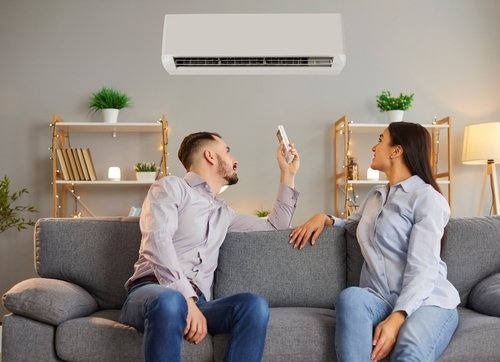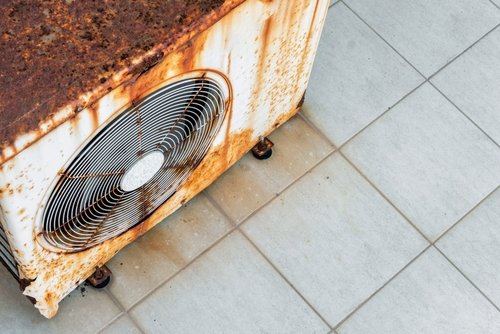Why Salt Air Can Affect Your HVAC System’s Air Quality

In this guide, we’ll explain how salt air affects HVAC components, what that means for indoor air quality, and how to protect your home’s comfort and health.
How Salt Air Interacts with Your HVAC System
Salt air contains tiny particles of sodium chloride that travel inland from the ocean. When these particles enter or settle on HVAC components:
- They corrode metal parts, including coils, fans, and ductwork.
- They accumulate on filters and internal surfaces, reducing efficiency.
- They can travel into ductwork, where they impact indoor air quality.
Because Delmarva experiences consistent coastal winds and humidity, salt exposure is continuous year-round.
Impact on Indoor Air Quality (IAQ)
When salt particles build up inside your HVAC system, they don’t just harm equipment — they affect the air you breathe:
1. Increased Particulate Levels
Salt particles mix with dust, pollen, and other airborne contaminants, increasing the amount of debris circulated through your home.
2. More Frequent Odors
Corroded metal parts can cause metallic or musty smells in the air when the system runs.
3. Reduced Filtration Efficiency
Salt can clog filters faster, making them less effective at trapping allergens, dust, and pollutants.
4. Higher Risk of Mold Growth
Salt particles + high humidity can create conditions inside ductwork that encourage mold or mildew growth, especially if the system isn’t regularly maintained.
Signs Salt Air is Affecting Your HVAC & Air Quality
Watch for these common indicators in coastal homes:
- Unusual smells (metallic, musty, or damp odors when the system runs).
- Dustier indoor surfaces despite regular cleaning.
- Frequent filter changes (filters becoming dirty faster than expected).
- Increased allergy or asthma symptoms in household members.
If you notice any of these signs, your system may need a coastal HVAC inspection to address corrosion and airflow quality.
How to Protect Your HVAC System from Salt Air
The good news? With proper maintenance and equipment care, you can minimize salt air damage and keep your indoor air clean:
1. Regular Professional Maintenance
- Schedule bi-annual tune-ups to clean coils, check ductwork, and inspect for corrosion.
- Coastal environments often require more frequent service than inland homes.
2. Upgrade Your Filtration System
- Consider high-MERV filters or whole-home air purification to capture smaller salt particles.
- Replace filters every 1–2 months in high-salt areas.
3. Protective Coatings on Outdoor Units
- Many coastal homeowners add anti-corrosion coatings to outdoor condenser coils.
- These coatings can extend the lifespan of components exposed to salt-laden air.
4. Seal and Clean Ductwork
- Properly sealed ducts prevent salty, humid air from leaking in.
- Regular cleaning removes built-up debris that can degrade air quality.

Final Takeaway
Schedule a coastal HVAC inspection with US Heating & Air today to protect your comfort and your home’s air quality.
FAQs: Salt Air & HVAC Air Quality
How far inland can salt air affect HVAC systems?
Even homes 10–15 miles inland can see effects from salt air due to wind patterns.
Will a standard HVAC system last as long near the coast?
Without proper maintenance, coastal HVAC systems may have a shorter lifespan due to corrosion — but preventative care can significantly extend life.
Can an air purifier help?
Yes. Whole-home air purifiers work with your HVAC to capture airborne salt particles, dust, and allergens, improving indoor air quality.
